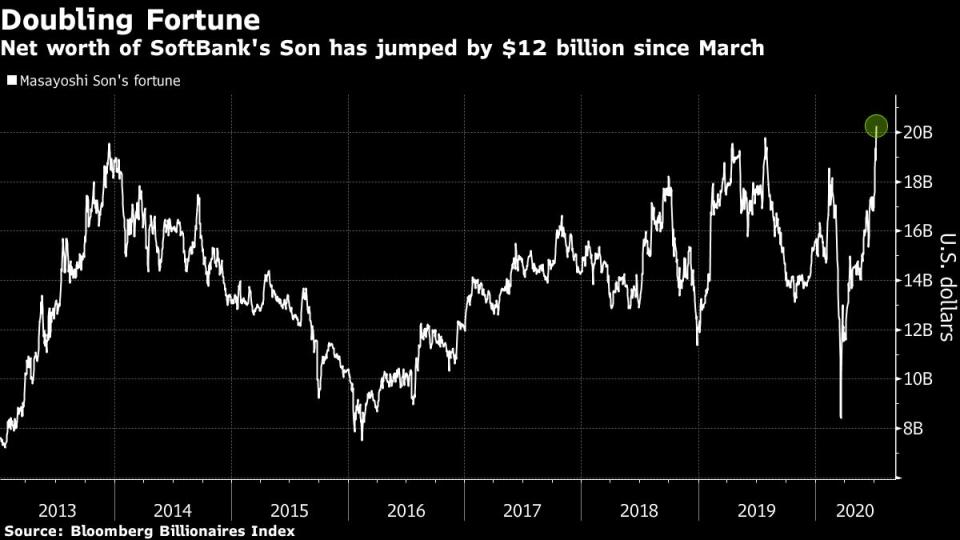With SoftBank Rally, Masa Son Adds $12 Billion to Fortune
(Bloomberg) -- SoftBank Group Corp. founder Masayoshi Son has enjoyed a $12 billion renaissance the past three months, easing the pressure on his intricately engineered personal finances.
With SoftBank Group’s shares surging to their highest price in two decades on Thursday, Son’s net worth hit $20 billion, more than doubling from $8.4 billion in March, according to the Bloomberg Billionaires Index. It is the first time the 62-year-old’s fortune has topped $20 billion since January 2013, when the ranking first started tracking his wealth.
The calculation excludes about $13.3 billion of his SoftBank Group shares pledged as collateral, representing some 40% of his stake, according to regulatory filings. A further 26% of his holding is lent out for a fee to different entities, mostly brokerages, likely to add liquidity to the market. Those shares are included in Son’s net worth calculation because he retains control over them.
“For those lending shares, it’s about creating incremental revenue,” said Andrew Dyson, chief executive officer of the International Securities Lending Association. He noted such transactions ease the execution of trades, while enabling hedging and shorting strategies. “Lending out securities generates hundreds of millions of dollars in fees a quarter.”
SoftBank Group shares have surged 133% from a low in March, taking the Tokyo-based company’s market value to $123 billion. While its Vision Fund lost almost $18 billion in the latest fiscal year as it wrote down the value of investments in WeWork, Uber Technologies Inc. and others, record equity buybacks and a series of wins have helped the stock recover. SoftBank Group sold part of its stake in T-Mobile US Inc. last month, and an online home-insurance provider that it’s backing more than doubled on its U.S. debut earlier in July.
While Son’s strategies are common among the wealthy, market volatility earlier this year showed that personal stock pledges, coupled with a heavy debt load, can bring risks. The pandemic-induced turmoil that sank equities resulted in some margin calls. Some individuals had to stump up collateral to avoid defaulting, and others had to liquidate at depressed prices. Chinese mogul Lu Zhengyao and Markus Braun of German fintech company Wirecard AG offer extreme examples of the risks of pledging shares.
Even stock lending worries some. Japan’s largest pension fund said in December it would stop the practice because it creates a vacuum in ownership when equities change hands.
SoftBank Group’s buoyant share price means such risks are remote for now. Son’s pledged stock is valued at almost triple the loan amount he said in a May earnings presentation he has received, according to calculations by Bloomberg.
SoftBank Group declined to comment on Son’s personal finances.
(Updates stock move and market cap in fifth paragraph)
For more articles like this, please visit us at bloomberg.com
Subscribe now to stay ahead with the most trusted business news source.
©2020 Bloomberg L.P.

 Yahoo Finance
Yahoo Finance 


